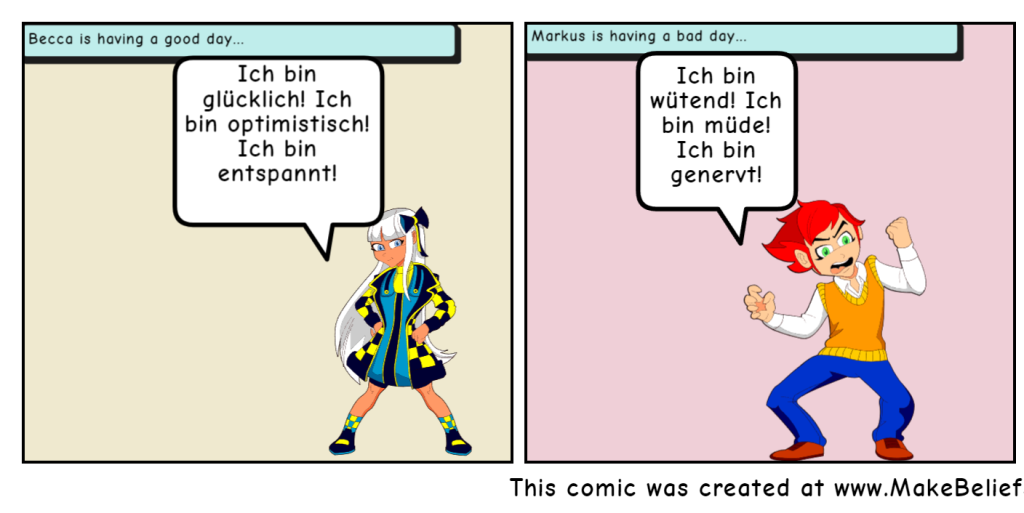3.4 Ich bin müde, weil…

Hallo alle zusammen!
Zum Aufwärmen machen wir unseren Tagesminiplausch und eine Wiederholung.
Wiederholung
Let’s begin with our review.
Jetzt bist du dran!
Think of a friend, classmate, or family member. Wie geht es ihm? Wie geht es ihr? Wie geht es xiem? In your written journal, answer one or more of the questions about the person you’re thinking of. Remember, you’ll start with either Es geht ihm/ihr/xiem.. or Ihm/Ihr/Xiem geht es …
Lektionsüberblick
Let’s recall that the question “Wie geht’s?” requires specific kinds of answer like we saw in the previous Lektion 3.3 (and in the 1010 Lektion 3.3) and that if you want to give a more specific response, you will need to start with “Ich bin…”
Because there are so many different words to talk about about feelings (Gefühle), other states of mind (Geisteszustände), and physical states (körperliche Zustände), we asked you in the 1010 Lektion 3.4 to pick just a couple to commit to memory. In this lesson, we will remind you of these words and ask you to commit more words to memory so that you have more options for your conversations. In addition, we will begin to work on saying why you a feeling a certain way. In the end, you will be able to 1) make several statements about your feelings, state of mind, and physical state, 2) give a simple reason behind some of them, and 3) ask “why?”.
Was weißt du schon?
You probably remember some feelings words from your previous experience with German. See what you can recall.
| Noch nicht start klar?
Du kannst immer auf die gleiche 1010-Lektion zurückgreifen! |
Not confident about starting this lesson?
You can always review the same Lektion from 1010. |
1) Ich bin…
Let’s start by reviewing and expanding our list of feelings. Remember that oftentimes the word for a feeling is similar in English and German. Take a look and listen. Which words in the list below are similar to English and which ones seem uniquely German?
Gefühle (Feelings)
| dankbar | sauer | beleidigt | optimistisch |
| deprimiert | verliebt | gelangweilt | unmotiviert |
| frustriert | nervös | stolz | besorgt |
| hungrig | inspiriert | wütend | ruhig |
| froh | irritiert | motiviert | verärgert |
Now let’s practice saying these words.
Read about Becca’s good day and Markus’ bad day in the activity below. Then practice building your vocabulary with the activity below. Be sure to click through to each question.

Now read and hear this conversation between Alex and Julia:
Alex: Julia, wie geht es dir?
Julia: Ich bin glücklich. Und dir?
Alex: Mensch, sag mal, wie geht es dir wirklich?”
Julia: Ich bin glücklich, und ich bin auch dankbar, inspiriert und optimistisch. Nun sag, wie geht es dir?
Alex: Ich bin nervös und besorgt.
Jetzt bist du dran!
2) Ich bin müde, weil…
Let’s start building longer sentence by using a useful word, weil. See if you can guess what this little word means by using the clues below.
| Ich bin müde, weil ich spät ins Bett gehe. | Ich bin glücklich, weil ich in der Natur bin. | |
 |
 |
Köln im Blickpunkt

Der „Halver Hahn“ ist ein typisches Kölner Gericht: ein Roggenbrötchen mit Käse, das trotz seines Namens nichts mit Huhn zu tun hat. Ein typischer Halver Hahn hat normalerweise etwa 350–450 Kalorien.
The “Halver Hahn” is a typical Cologne dish: a rye roll with cheese that, despite its name, has nothing to do with chicken. A typical Halver Hahn has 350-450 calories.
Jetzt bist du dran!
3) Warum?
The word weil (because) answers the essential question, warum? (why). Read and listen to the comic below and then complete the matching activity.
Jetzt bist du dran!
– Ich bin glücklich, weil ich in der Natur bin. or -> Ich bin glücklich, weil ich nicht in der Natur bin.
– Ich bin glücklich, weil ich Geburtstag habe. or -> Ich bin glücklich, weil ich morgen Geburtstag habe.
– Ich bin nervös, weil ich heute einen Test habe. or -> Ich bin nicht nervös, weil ich heute keinen Test habe.
Zum Schluß
Julia: Ich bin glücklich. Und dir?
Alex: Mensch, sag mal, wie geht es dir wirklich?”
Julia: Ich bin glücklich, und ich bin auch dankbar, inspiriert und optimistisch. Nun sag, wie geht es dir?
Alex: Ich bin nervös und besorgt.
Julia: Warum bist du nervös und besorgt?
Alex: Ich bin nervös und besorgt, weil ich zum ersten Mal eine Kursmappe* für meinen Deutschkurs machen muss.

*As you conclude this lesson, don’t forget to check Canvas!*

Media Attributions
- Good day comic made at www.MakeBeliefsComix.com © This comic strip was generated at http://www.MakeBeliefsComix.com. Used by permission of author and site creator Bill Zimmerman.
- 3.4 alex und Julia_pexels-andres-ayrton-6551222 © Andres Ayrton is licensed under a CC0 (Creative Commons Zero) license
- Photo of sleeping man at computer by https://www.flickr.com/photos/rvp-cw/8593652535, Attribution-NoDerivs 2.0 Generic © Ricardo Velasquez
- Photo of man in grass by pexels-artempodrez-4816760 © Artem Podrez
- Photo of Halve Hahn by © Superbass / CC BY-SA 4.0 (via Wikimedia Commons)

